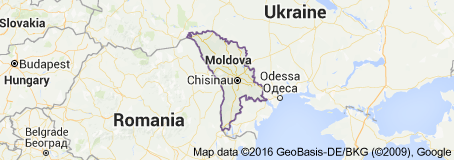Demonstrating perversity, The EU may fine countries for rejecting refugees
 Moldova
Moldova
Country in Europe
Moldova, an Eastern European country and former Soviet republic, has terrain encompassing forests, rocky hills and vineyards. It shares linguistic and cultural roots with its neighbor, Romania. Its wine regions include Nistreana, known for its reds, and Codru, home to some of the world’s largest cellars. The capital, Chișinău, has Soviet-style architecture and the National Museum of History, exhibiting ethnographic and art collections.
Capital: Chișinău
Gross domestic product: 7.97 billion USD (2013) World Bank
President: Nicolae Timofti
Population: 3.559 million (2013) World Bank
Official language: Romanian
In a sickening gesture of its malevolence toward native Europe, The EU body has threatened to fine those Eastern European countries not going along with the genocide program but which instead maintain their responsibility to foster and protect their native populations with migration control. In particular, the EU is targeting with genetic infection not only those countries characterized by healthy native demographic maintenance but is at the same time targeting with a devastating economic lose-lose proposition those countries, such as Poland, with the nerve to be doing fairly well economically and those countries such as Moldova, clinging to economic life. Perversely thus, the EU is punishing good demographic behavior, those who are economically well behaved and those that can least afford it - - threatening them with heavy fines if they do not participate in EU migration programs that would be both disastrous to them economically and tantamount to biological weaponry deployed against their native genome.
EU may fine countries for rejecting refugees, 3 May 2016:
The EU Commission plans to impose fines on countries that refuse to take refugees under revised EU asylum laws to be put forward on Wednesday (4 May).
The commission will propose a sanction of €250,000 per refugee, according to the Financial Times.
The commission’s proposal will maintain the guiding principle of the current system that the country where migrants first step into the EU must deal with asylum applications.
But it proposes that when a country at the EU’s external border is overwhelmed, asylum seekers should be distributed across the continent.
The commission has been trying to encourage reluctant countries, particularly in central and eastern Europe, to take part in the redistribution system.
Slovakia and Hungary have already brought a court case to challenge an earlier EU decision to redistribute migrants based on a mandatory quota.
But commission officials say the outcome of the court’s decision will not affect their plans to overhaul the asylum system, known as the Dublin regulation.
EU countries last year agreed to redistribute 160,000 asylum seekers across Europe in two years, but have so far actually redistributed only a small portion.
Central European politicians have been vocal about an earlier version of the proposal for mandatory redistribution that was released last month.
At the time, Czech European affairs minister Tomas Prouza tweeted: “Permanent quotas once again? How long will the EU commission keep riding this dead horse instead of working on things that really help?”
Diplomats from eastern EU states have told this website that they are not “heartless people” and they are willing to help refugees in other ways, but they believe a redistribution system will simply lead to more immigrants arrive in the EU.
Turkey falling short
Along with the revised Dublin regulation, the commission is expected to recommend visa-free travel for people from Turkey and Kosovo on Wednesday, even if Ankara is not able to fulfil all the 72 benchmarks that the EU set as conditions.
Sources suggest Turkey is falling short on a handful of the demands – for example issuing biometric passports, and granting visa-free travel to Turkey for EU countries including Cyprus, which Turkey does not recognise.
Other outstanding issues include data protection, fighting corruption, effective cooperation with Europol and state-level law enforcement agencies, and a revision of anti-terror laws so that they cannot be used against journalists or opposition figures.
However, the commission will suggest visa-free travel with the condition that these criteria are met by the end of June, when Turkey is expecting visa requirements to be lifted.

Posted by Visegrad 4 punishment on Fri, 06 May 2016 17:35 | #